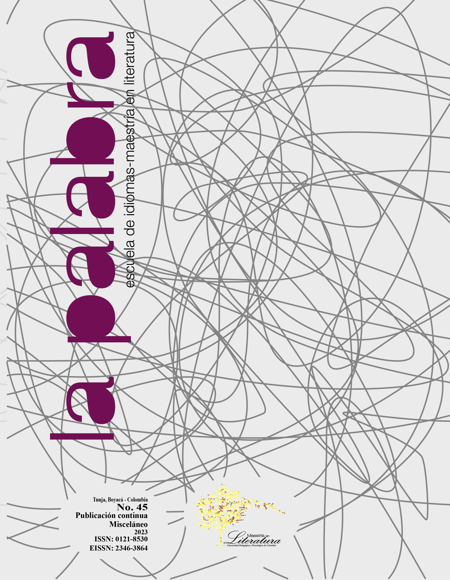Ernesto’s Journey of Individuation: A Jungian Analysis of José María Arguedas’s Los ríos profundos

Abstract
This paper explores the journey of individuation of Ernesto, the main character of Los ríos profundos (1958), written by José María Arguedas. By applying the Jungian literary theory, one can see the process of individuation in Ernesto as he progresses through the novel. As Ernesto begins his transition from the Andean world to the Western world, he also crisscrosses from his collective unconscious to his consciousness. His journey exhibits the painful but exciting journey between the two realms of the psyche. Arguedas presents the following five Jungian archetypes in many ways and on many levels in this novel: persona, ego, shadow, anima and self. The process of individuation is not only an inner journey for Ernesto, it is also a learning process, which allows his maturation. This essay explores Los ríos profundos, a “literature of migration,” as Antonio Cornejo Polar (1998) has denominated Arguedas’s work, and “literature of growth,” as Luis Harss (1983) and Ariel Dorfman (1980) discuss in their articles, while focusing on the journey of Ernesto and incorporating a Jungian literary perspective.
Keywords
Individuation, Carl Jung, Los ríos profundos, Persona, Ego, Anima, self
Author Biography
Luis Miguel Herrera Bejines
Writer and Teacher Assistant at the University of Western Ontario. A PhD candidate in the Hispanic Studies and Migrant Ethnic Relation Programs at the University of Western Ontario, Canada. His research interests focus on the literature of Equatorial Guinea, specifically, he works with the novelistic production of the Equatorial Guinean writer Donato Ndongo-Bidyogo. He is particularly interested in the literature of migration.
References
- Abrams, Jeremiah, and Connie Zweig. Meeting the Shadow: The Hidden Power of the Dark Side of Human Nature. G. P. Putnam’s Sons, 1991. Print.
- Arguedas, José María. Diamantes y pedernales. Editoriales Arca, 1975. Print.
- ---. El sueño del pongo. Ediciones Populares Mama-Ocllo, 1979. Print.
- ---. El zorro de arriba y el zorro de abajo. Fundación editorial: el perro y la rana, 2016. Print.
- ---. Los ríos profundos. Fundación Editorial: el perro y la rana, 2006. Print.
- ---. Yawar fiesta. Translated by Frances Horning Barraclough. Univesity of Texas Press, 1985.
- ---. Todas las sangres. Editorial Losada, S.A., 1970. Print.
- Butler, Judith. “Performative Acts and Gender Constitution: An Essay in Phenomenology and Feminist Theory.” Theatre Journal, vol. 40, no. 4, 1988, pp. 519–31. Print.
- Buckley, Jerome H. Season of Youth: The Bildungsroman from Dickens to Golding. Harvard University Press, 1974. Print.
- Cornejo Polar, Antonio. Los universos narrativos de José María Arguedas. Editorial Losada, 1973. Print.
- Datun Center. Carl Gustav Jung - In His Own Words Documentary, 1990. YouTube Web 5 Dec, 2018. https://www.youtube.com/watch?v=4sgTWKCXQs8
- Dorfman, Ariel. “Puentes y padres en el infierno: ‘Los ríos profundos.’” Revista de Crítica Literaria Latinoamericana, vol. 6, no. 12, 1980, pp. 91-137. Print.
- Elmore, Peter. “‘Los ríos profundos’, de José María Arguedas: las lecciones de la memoria.” Revista Hispánica Moderna, vol. 49, no. 1, 1996, pp. 76–91. Print.
- Ford, Deborah. The Dark Side of the Light Chasers. Penguin, 2010. Print.
- Forgues, Roland. José María Arguedas: del pensamiento dialéctico al pensamiento trágico: historia de una utopía. Vol. 4, Editorial Horizonte Lima, Peru, 1989. Print.
- García Liendo, Javier. Migración y frontera: experiencias culturales en la literatura peruana del siglo XX. Iberoamericana Vervuert, 2017. Print.
- Goldbrunner, Josef. Individuation: A Study of the Depth Psychology of Carl Gustav Jung Pantheon, 1956. Print.
- Harss, Luis. “‘Los ríos profundos’ como retrato del artista.” Revista Iberoamericana, vol. 49, no. 122, 1983, pp. 133–141. Print.
- Jacobi, Jolande. Complex/Archetype/Symbol in the Psychology of CG Jung. Pantheon Books, 1959.
- ---. The Way of Individuation. Hodder & Stoughton, 1967. Print.
- Jiménez, Luis A. “Wo(Men) in the Carnivalesque Discourse.” José María Arguedas: Reconsiderations for Latin American Cultural Studies, vol. 29, 1998. Print.
- Jung, Carl Gustav. Two Essays on Analytical Psychology. 2nd. Ed. Bollingen Series; Princeton University Press, 1966. Print.
- ---. The Portable Jung. Penguin Books, 1971. Print.
- ---. Collected Works. Routledge & Kegan Paul, 1953. Print.
- ---. The archetypes and the collective unconscious. Routledge, 2014, pp. 4-10.
- Lambright, Anne. “Time, Space, and Gender: Creating the Hybrid Intellectual in «Los Ríos Profundos».” Latin American Literary Review, vol. 28, no. 55, Jan. 2000, pp. 5–26. Print.
- Lienhard, Martin. Cultura popular andina y forma novelesca zorros y danzantes de la última novela de Arguedas. Latinoamericana Editores, 1981. Print.
- Mendívil, Julio. “Huaynos híbridos: estrategias para entrar y salir de la tradición.” Lienzo, núm. 25, 2004, pp. 27-64.
- Moretti, Franco. The Way of the World: The Bildungsroman in European Culture. Verso, 1987. Print.
- Rouillon, José Luis. Cuentos olvidados y notas críticas a la obra de José María Arguedas. Ediciones Imágenes y Letras, 1973. Print.
- Rowe, William. Mito e ideología en la obra de José María Arguedas. Instituto Nacional de Cultura, Lima, 1979. Print.
- Rowland, Susan. C.G. Jung and Literary Theory: The Challenge from Fiction. Macmillan, Houndmills, Basingstoke, Hampshire, 1999, pp 9-38. Print.
- Sáenz Cortez, Tania Shirley. Pachakuti: una lectura de Los ríos profundos de José María Arguedas. Tesis de licenciatura, Universidad Mayor de San Marcos, 2003. Print.
- Sandoval, Ciro A. and Sandra M. Boschetto. (Edit.) “Migrant Conditions and Multicultual Intertextuality.” Antonio Cornejo Polar translated by Alita Kelley. Jose María Arguedas: Reconsiderations for Latin American Cultural Studies. Ohio University Press, 1998, pp. 187-198. Print.
- Slaughter, Joseph R. Human Rights, Inc.: The World Novel, Narrative Form, and International Law. Fordham University Press, 2007. Print.
- Ubilluz, Juan Carlos et al. Contra el sueño de los justos: la literatura peruana ante la violencia política. Vol. 30. IEP, Instituto de Estudios Peruanos, 2009. Print.